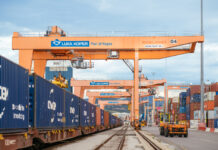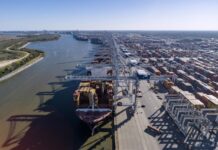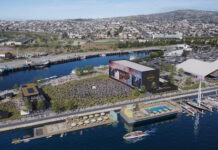
Theo Notteboom, a PortEconomics member, compiled data revealing container traffic trends at the top 15 container ports within the European Union during the first half of the year. Notably, Piraeus, one of the major Mediterranean ports, experienced substantial traffic losses. Notteboom attributed this downturn to the East Mediterranean becoming a maritime dead end following a dramatic drop in Suez Canal transits.
Container News further investigated the implications of these disruptions on the Mediterranean ports, with a particular focus on the COSCO-owned Greek port. The analysis confirmed that the Port of Piraeus indeed saw a significant decrease in container volumes following the escalation of Houthi attacks in the Red Sea. This reduction in traffic underscores how geopolitical events can have far-reaching effects on global maritime trade routes and port performance.

Interestingly, while Mediterranean ports like Piraeus struggled, Spanish ports demonstrated a remarkable turnaround. Container News reported significant year-on-year increases in container volumes for Spanish ports during the same period. This unexpected boost can be attributed to the shifting dynamics in maritime trade routes. With the disruptions in the Red Sea, many shipping companies sought alternative routes, leading to a re-routing of cargo through Spanish ports. As shipping companies adjusted their routes to avoid the affected areas, Spain’s ports emerged as crucial transshipment hubs, thereby capturing a larger share of container traffic. That’s why Port of Valencia is on track to surpass the Greek port by the end of the year.
In contrast to the drastic changes observed in Piraeus and Spanish ports, Italy and France maintained relatively stable connectivity. The stability in Italian and French ports suggests that these ports were either less impacted by the disruptions or were able to sustain their operations through other means, such as diversified trade routes or robust logistical frameworks.
A comparative analysis between Mediterranean ports and key ports in the Gulf countries reveals a sharp decrease in connectivity for Gulf ports following the Red Sea events. The data indicates that Gulf ports, which traditionally serve as significant transit points for shipping trade, experienced notable declines in their connectivity scores. This decline can be attributed to the ripple effects of the disruptions in the Red Sea, impacting trade flows and shipping patterns in the Gulf region.

The decline in connectivity for Gulf ports highlights how disturbances in one region can reverberate across other key maritime hubs. The ripple effect from the Red Sea disturbances has caused a noticeable downturn in the connectivity of Gulf ports, illustrating their vulnerability to regional geopolitical tensions.
The strategic positioning of Spanish ports as alternative hubs has allowed them to capitalize on the disruptions elsewhere. By serving as key transshipment points for redirected cargo, Spanish ports have managed to turn a challenging situation into an opportunity for growth.




